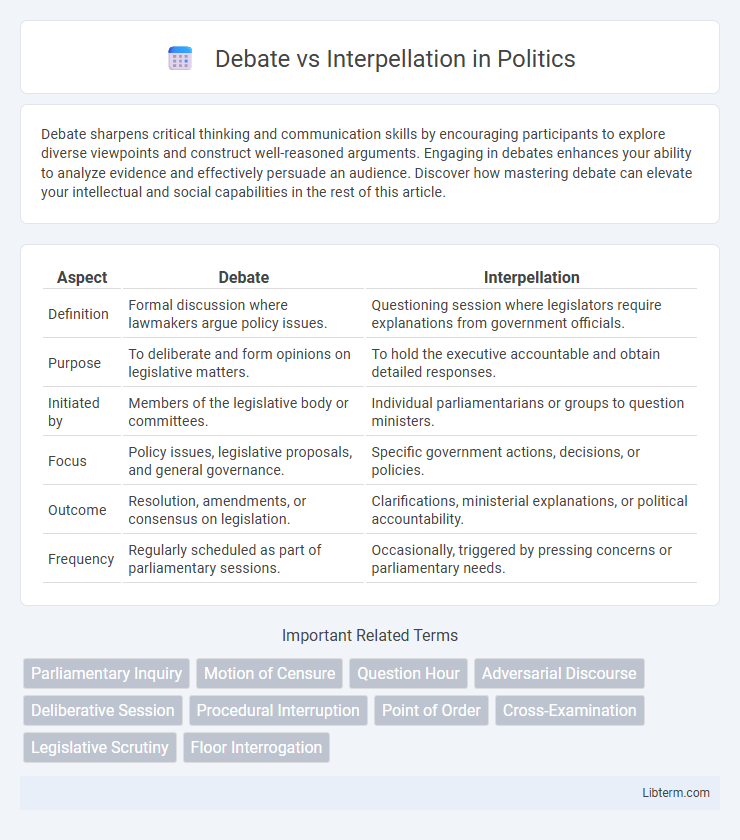Debate sharpens critical thinking and communication skills by encouraging participants to explore diverse viewpoints and construct well-reasoned arguments. Engaging in debates enhances your ability to analyze evidence and effectively persuade an audience. Discover how mastering debate can elevate your intellectual and social capabilities in the rest of this article.
Table of Comparison
| Aspect | Debate | Interpellation |
|---|---|---|
| Definition | Formal discussion where lawmakers argue policy issues. | Questioning session where legislators require explanations from government officials. |
| Purpose | To deliberate and form opinions on legislative matters. | To hold the executive accountable and obtain detailed responses. |
| Initiated by | Members of the legislative body or committees. | Individual parliamentarians or groups to question ministers. |
| Focus | Policy issues, legislative proposals, and general governance. | Specific government actions, decisions, or policies. |
| Outcome | Resolution, amendments, or consensus on legislation. | Clarifications, ministerial explanations, or political accountability. |
| Frequency | Regularly scheduled as part of parliamentary sessions. | Occasionally, triggered by pressing concerns or parliamentary needs. |
Introduction to Debate and Interpellation
Debate is a structured discussion where participants present arguments for or against a specific topic, aiming to persuade an audience or decision-makers through logical reasoning and evidence. Interpellation, primarily used in parliamentary contexts, involves formal questioning of government officials or ministers by legislators to hold them accountable and clarify policies. Both serve as crucial mechanisms in democratic processes, promoting transparency and informed decision-making.
Defining Debate: Purpose and Structure
Debate is a formal, structured discussion where participants present arguments on opposing sides of a specific issue, aiming to persuade an audience or decision-makers. Its purpose revolves around critical examination, the exchange of diverse viewpoints, and the clarification of complex topics through reasoned argumentation and evidence. Debate typically follows a set format, including opening statements, rebuttals, and closing arguments, ensuring organized discourse and balanced participation.
Understanding Interpellation: Key Features
Interpellation is a parliamentary procedure allowing lawmakers to formally question government officials about specific policies or actions, promoting transparency and accountability. It differs from debate by centering on structured inquiry rather than open discussion, enabling detailed examination of executive decisions. Key features include scheduled questioning sessions, mandatory official responses, and the possibility of follow-up queries to clarify or challenge government positions.
Historical Origins of Debate and Interpellation
Debate traces its origins to ancient Greece, where the practice of formal argumentation was central to democratic decision-making and public discourse, notably in the Athenian Agora during the 5th century BCE. Interpellation, in contrast, stems from parliamentary traditions in medieval European assemblies, evolving as a formal mechanism for legislators to question government officials and hold executive power accountable. The historical development of debate emphasizes rhetorical skill and persuasion, while interpellation focuses on procedural inquiry within legislative frameworks.
Comparative Analysis: Debate vs Interpellation
Debate involves a structured, formal exchange of arguments where participants present opposing views to persuade an audience or decision-making body, emphasizing rhetoric and evidence. Interpellation, in contrast, is a direct questioning process typically used by legislators to hold public officials accountable by requiring them to explain or justify policies and actions. While debate centers on broad discussion and persuasion, interpellation functions as a targeted investigative tool within parliamentary procedures, emphasizing accountability and transparency.
Roles and Participants in Debate and Interpellation
Debate involves multiple participants, typically legislators or council members, who discuss, argue, and deliberate on proposed policies or legislation to reach a consensus or decision; roles include speakers, moderators, and sometimes timekeepers. Interpellation features a government member, often a minister, responding to questions posed by legislators or parliamentary members aiming to hold the executive accountable and clarify policy details. The debate fosters collective deliberation, while interpellation emphasizes direct questioning and explanation between legislators and government officials.
Procedural Differences Explained
Debate involves a structured exchange of arguments where participants present and defend their positions, following strict time limits and rules for speaking order to ensure organized discussion. Interpellation is a formal procedure used primarily in parliamentary systems where a member questions a government official or minister, requiring a direct response or explanation, often triggering accountability mechanisms. Procedurally, debate emphasizes argumentation and persuasion, while interpellation centers on obtaining information and official clarification through a question-and-answer format.
Impact on Policy and Governance
Debate fosters open dialogue and diverse perspectives, enhancing transparency and informed decision-making in policy development. Interpellation serves as a direct mechanism for accountability, compelling government officials to explain actions and justify policies before legislative bodies. Both processes contribute to robust governance, with debate promoting consensus-building and interpellation ensuring executive responsibility.
Advantages and Limitations of Each Approach
Debate allows for dynamic exchange of ideas, promoting thorough examination of diverse viewpoints and encouraging critical thinking, but it may sometimes lead to polarization or dominance by more vocal participants. Interpellation offers precise accountability by compelling direct responses from officials, enhancing transparency and responsibility, yet it can be limited by rigid procedural constraints and may not foster broad public engagement. Both approaches serve complementary roles in democratic processes, balancing open discourse with focused interrogation.
Conclusion: Choosing the Right Method for Dialogue
Debate emphasizes structured argumentation with the goal of winning a position, while interpellation invites open-ended questioning to clarify intentions and beliefs. Selecting the right method depends on the desired outcome: use debate to assert and defend specific viewpoints, and interpellation to foster understanding and collaborative dialogue. Effective communication often requires balancing both approaches to navigate complex discussions successfully.
Debate Infographic

 libterm.com
libterm.com